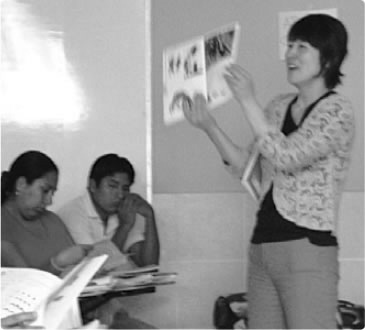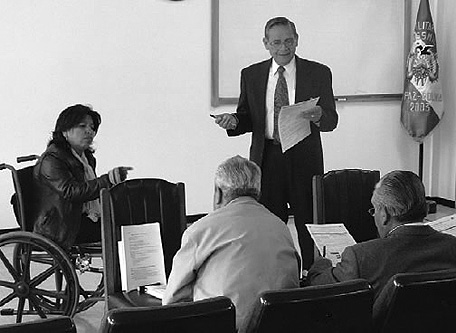Japan's Official Development Assistance White Paper 2011
Column 2
A World that Promotes Coexistence with Disabled People
—Special Needs Education in Bolivia—

Ms. Kamijo introducing her educational experience in Japan to trainees (Photo: Takako Kamijo)
Takako Kamijo works as a JICA expert with the Bolivian ministry of education. She has been involved in special needs education in Bolivia ever since she was first dispatched to the country as a Japan Overseas Cooperation Volunteer (JOCV) in 1998. Ms. Kamijo studied special needs education at university, and after graduation joined the faculty of an elementary school and a school for special needs education. Following a nine-year career as a teacher, she applied to the JOCV program that she had always been attracted to, and was selected and dispatched to a facility for children with disabilities in the department of Oruro, located some 230 kilometers from Bolivia's administrative capital of La Paz.
Throughout her activities, Ms. Kamijo was forced to notice the tough situation faced by disabled children and their families in Bolivia. The biggest problem for the children was that their presence was invisible. Their parents suffered because they did not recognize their children were disabled. The children themselves were locked up at home and had lost their place in society. And this society, where schools and teachers discriminated against them, saw their misfortune as some divine punishment. Ms. Kamijo met so many disabled children and their families who were struggling to survive amid these unfair circumstances, and this and her experience drove her to take action for the disabled children of Bolivia. When she heard that a significant number of students repeated school years at Oruro's "regular" schools and kindergartens, she suspected it was because of their disability. She did some research and found that a majority of those children who had problems or repeated school years did in fact have a disability. With approval from the Oruro education committee, Ms. Kamijo opened experimental classes for children with disabilities and accepted some 40 students between ages 5 and 15. And at the end of her term as a JOCV, she decided to return to Bolivia. Thereafter, she has worked as a volunteer expending her own funds, and later with the United Nations, to sustain and develop these classes.
In the beginning, only Ms. Kamijo and one other local volunteer taught the classes. But as word travelled, she attracted more students and expanded the number of classes from two to three. Eventually, it became difficult for a staff of only two to continue the classes. To win the support of Bolivia's central government, Ms. Kamijo approached the ministry of education to get it to approve her classes as an official curriculum at public schools. A one-way trip from Oruro to La Paz, where the ministry of education is based, takes some three and a half hours. Yet Ms. Kamijo made time to see the officer in charge in person. Despite her persistence, it took an eternity to get a nod out of him. After about six months, the vice minister finally signed approval for her classes to be incorporated in public schools. Her passion to follow the officer wherever he went and persuade him had at last borne fruit.
Ms. Kamijo's efforts were welcomed from the Bolivian side as well. She went on to be a JICA Senior Volunteer from 2004, and a JICA expert since 2010, to support Bolivia's ministry of education in its ongoing national project to improve special needs education (*1). One of Ms. Kamijo's missions has been to grasp the precise number of disabled people in Bolivia. She had realized that a lack of data was hindering the country from taking measures to support them. Project for the program of the unified registration of the person with disability, which started in 2006 with support from JICA, helped immensely in grasping the facts about disabled people in Bolivia. This was a dream come true not only for Ms. Kamijo but also for her colleague, Ms. Feliza Ali (then Executive Director of the National Committee for Persons with Disabilities), who herself is a wheelchair user and yet had devoted her energy along with Ms. Kamijo to making the program a reality. The program has culminated in the Bolivian governments' officially acknowledging the presence of disabled people—making them at last a visible presence—and at the same time holding the government responsible for devising policies to support them. It was the first solid step for Ms. Kamijo and Ms. Ali, who through the arduous task of conceiving the movement, wish for all people with disabilities to be acknowledged by society, and to build a world that promotes coexistence with them.
(*1) Teachers Training in Special Needs Education (June 2010–November 2012)

Ms. Ali (left) and a doctor giving explanations at a training session (Photo: Takako Kamijo)
